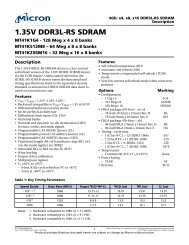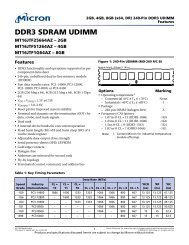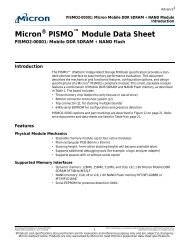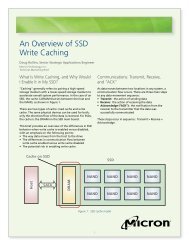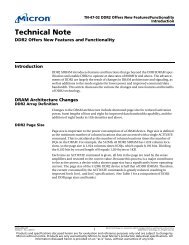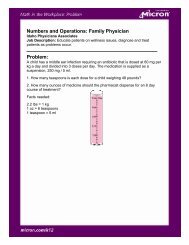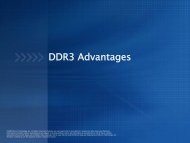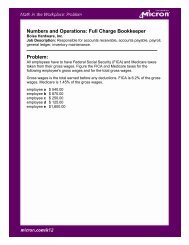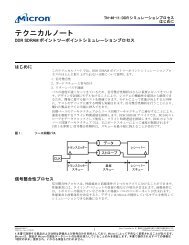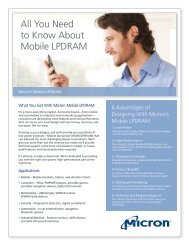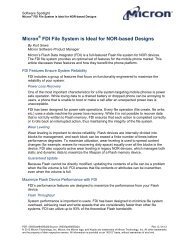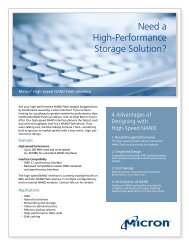Code of Business Conduct and Ethics - Micron
Code of Business Conduct and Ethics - Micron
Code of Business Conduct and Ethics - Micron
You also want an ePaper? Increase the reach of your titles
YUMPU automatically turns print PDFs into web optimized ePapers that Google loves.
• Information marked “confidential,” or something similar, belonging to anyone else<br />
even if the proprietary information just shows up on your desk;<br />
• Marketing or other business information exchanged with competitors;<br />
• Confidential information about a competitor’s bid if you are involved in bidding,<br />
especially on government contracts. If you come into possession <strong>of</strong> such<br />
information, call the Legal Department;<br />
• Confidential information on a competitor that someone has <strong>of</strong>fered to sell; or<br />
• Anything else that feels wrong.<br />
Unfair <strong>Business</strong> Practices<br />
<strong>Micron</strong> competes vigorously for business, but some conduct in the name <strong>of</strong><br />
competition is not consistent with the law or <strong>Micron</strong>’s commitment to integrity.<br />
Never compete by using unfair practices, such as:<br />
• Disparaging or making false statements about competitors or their services;<br />
• Stealing or misusing competitors’ trade secrets;<br />
• Intentionally cutting <strong>of</strong>f a competitor’s sources <strong>of</strong> supply;<br />
• Illegally inducing customers to break contracts with competitors;<br />
• Unlawfully requiring someone to buy from <strong>Micron</strong> before we will buy from them; or<br />
• Paying bribes to help the Company’s business or to hurt a competitor.<br />
If you have questions about unfair business practices, contact the Legal Department.<br />
Trade Restrictions, Export Controls And Boycott<br />
Laws<br />
Trade Restrictions <strong>and</strong> Export Controls<br />
The United Nations, the E.U., Switzerl<strong>and</strong>, the U.S., <strong>and</strong> a number <strong>of</strong> other<br />
jurisdictions periodically impose prohibitions or other restrictions on export <strong>and</strong><br />
trade dealings with certain countries, entities <strong>and</strong> individuals. Trade restrictions<br />
take many forms, including bans on:<br />
• Exports to a sanctioned country;<br />
• Imports from, or dealings in property originating in, a sanctioned country;<br />
• Travel to or from a sanctioned country;<br />
• New investments in a sanctioned country; <strong>and</strong><br />
• Financial transactions <strong>and</strong> dealings involving a sanctioned country or<br />
designated individuals <strong>and</strong> entities.<br />
Licensing Requirements<br />
Trade restrictions also impose licensing requirements on the export <strong>of</strong> certain<br />
products or technology.<br />
The reach <strong>of</strong> these types <strong>of</strong> laws varies. They can restrict the activities <strong>of</strong> citizens or<br />
residents (including companies) with regard to certain countries, or governments,<br />
financial institutions, firms or individuals resident in or identified with such countries.<br />
Trade restrictions are, or have been, in force with respect to: Cuba, Iran, Iraq, Libya,<br />
Myanmar (Burma), North Korea, Sudan <strong>and</strong> Syria. You should not engage in any<br />
i<br />
If you need further<br />
information on trade<br />
restrictions or export controls,<br />
contact the Logistics/Traffic<br />
Department or the<br />
Legal Department. Check<br />
the Trade site on the MERC<br />
for a current list <strong>of</strong> countries<br />
subject to trade restrictions.<br />
13



